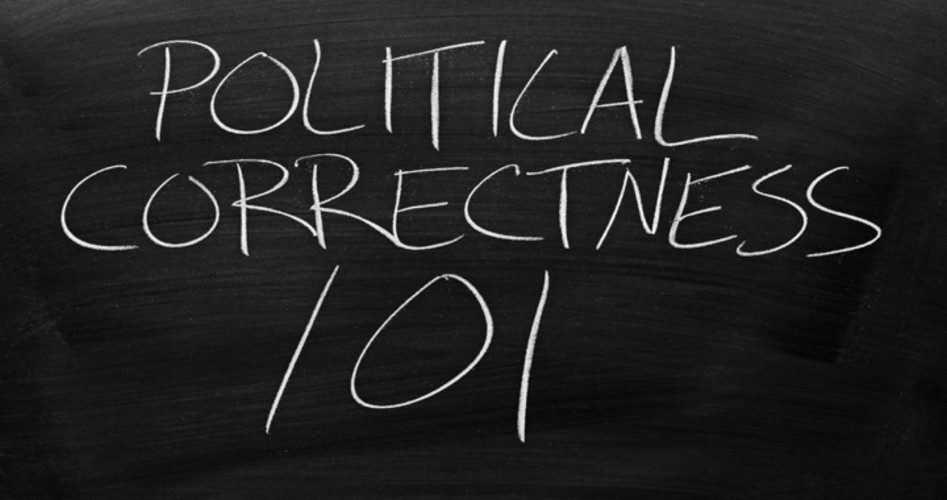
Man, oh man, when will we man-up and say no to political correctness? It certainly won’t happen soon enough for a University of Florida student just penalized for using the word “man” in an essay.
The College Fix reports on this college brokenness:
History major Martin Poirier wrote “Water is a thing prior to man” on a paper for a history class called “History of Water.”
“Thoughtful paper, although the writing-mechanics errors are killing you,” Professor Jack Davis wrote at the bottom of the paper. He gave the student a B minus, according to a copy of the essay published in the student news outlet the Daily Nerv.
Davis circled “man” and referenced his Writing Mechanics Exercise #20, which draws a distinction between “mankind” and “humankind.”
Davis defended the penalization in an email to The College Fix. He explained that the “exercise and inclusion of ‘humankind’ are consistent with the Chicago Manual of Style, the style and the usage guide followed in the discipline of history.”
Davis also said the exercise is “not to enforce political correctness” but is “both a grammar refresher and a style and user guide.”
Yes, who’d ever think enforcing political correctness was the goal? Perish the thought! I don’t know if Professor Davis also teaches the “History of Air,” but he certainly knows something about its hot version.
Just consider that, when challenged by Poirier, Davis commenced a rant on “how the intent for gender-neutral pronouns were ‘pre-baked into the original intent of the independent American nation’s values and founding documents,’” reports the Daily Nerv. Now we know where our rogue judges (forgive the redundancy) get their ideas.
What sparked Poirier’s challenge was that “the night before the papers were returned to students, Professor Davis sent a copy of Poirier’s essay to the entire class and asked the students to ‘scrutinize’ the mechanics and content of his essay for the following class period. According to Poirier, Professor Davis refers to this as putting a student in the ‘hot seat,’” the Nerv also informs.
Yet Davis ended up on the hot seat because, though he’d maintained Poirier’s anonymity, the student stood up for his beliefs and defended himself in class — and made the story go viral.
And Poirier has a lot of standing up to do. After all, despite the fact that “Dr. Davis requires us [undergraduates] to use only gender neutral expressions,” the student states, the professor is actually somewhat moderate compared to his colleagues. As Poirier told the Nerv, “I have plenty of more examples of bias in other courses, many much more severe.”
Davis claims he’s only interested in grammatical rectitude, but this reflects either ignorance or intellectual dishonesty. While he insists that “humankind” (a relatively new word) is the only grammatically correct one, “mankind” is a synonym and the more historically common term.
Of course, it’s easy to mock this nonsense, yet the Left engages in perpetual language manipulation for a reason: Words shape thoughts. This is why conservatives err tragically, and fatally, when allowing these cultural changes to proceed unanswered.
As the 1959 book The Tyranny of Words points out, the side that defines the vocabulary of a debate, wins the debate. It isn’t hard to understand: Imagine a German culture and a French one were vying for primacy in a certain geographical area. If the French could convince all the Germans to speak French, wouldn’t they already have won at least half the battle?
It’s no different when conservatives use the Lexicon of the Left, which they do routinely. Oh, I’m not referring to “humankind,” “snowperson,” “ze,” or any of the other cutting-edge language innovations. But if you’ve used “gender,” “underprivileged,” or “African-American,” the leftist tyranny of words has its jackboot on your tongue.
This is easy enough to remedy. While France has a “French academy” to establish the official rules of the language, there is no corresponding entity in English. Thus, there are no official rules of English — only conventions. This means it’s up to you, me and everyone else to, with our words and pens, uphold proper standards.
What follows are examples of how you can strike culture-war blows in everyday speech and writing.
• Use “sex,” not “gender”: Unbeknownst to most, “gender” was almost never used in reference to people until relatively recently. Instead, its definition was as presented in my 1975 edition of American Heritage School Dictionary: “n. In grammar, one of a number of categories, such as masculine, feminine, and neuter, into which words are divided.” The book says absolutely nothing about usage relating to individuals’ sex.
What happened? The term was co-opted for the purposes of facilitating the homosexual/“LGBT” agenda. After all, to normalize something, it helps to lump it in with what’s normal. But social engineers couldn’t call an invented designation (e.g., neutrois) another “sex” because it’s already cemented in people’s minds that there are only two sexes. So “gender,” which already included multiple categories, is the perfect term.
The proof is in the pudding, too, as sexual revolutionaries have now defined literally scores of “genders.”
• Use “poor,” not “disadvantaged” or “underprivileged”: Always be suspicious when people substitute a four or five-syllable word for a simple monosyllable. “Poor” merely describes economic state, but the other two terms have serious connotations.
“Poor” is merely an adjective, which describes, yet “privilege” and “disadvantage” can be verbs, which denote action. And action implies an actor. Now, if some actor (external agency) “privileged” some and “disadvantaged” others, not only does this mean that people’s success is through no effort of their own, but it’s also very unfair. That outside agency then has an obligation to balance the scales via income redistribution.
• Use “black,” not “African-American”: Many terms have been used to refer to black people, some pejorative and some not so. But one thing they all shared was that they referred only to racial characteristics, not geographical area of origin. “African-American,” however, partially shifts the focus away from the land in which we live and toward a different part of the world. It thus serves to further divide and alienate blacks from America.
The term is also very imprecise when read literally. If I’m an Afrikaner or an Arab North African (both classified as Caucasian) who has immigrated to our nation and been naturalized, am I an “African-American”?
• Avoid inclusive language: It’s not just the aforementioned “snowperson,” “chairperson,” “humankind” and other formulations indicative of hang-ups, but also the all-too-common “he or she.” First, note that terms such as “man” and “chairman” are inclusive; “man” in the sense of “all people” includes all people, and “chairman” can refer to a person of either sex.
This obsession with demasculinizing the language reflects the nonsensical idea that the sexes should be treated identically, which no one actually believes (should we eliminate women’s sports?). It also leads to ever greater lunacy, such as so-called “gender-neutral” pronouns, examples being “ze”, “hir”, “mer” and “zir.”
Obviously, the above list is far from complete. But a good rule of thumb is that if you’re not speaking like your great-grandfather, you’re probably doing something wrong.
So watch your mouth — and don’t speak out of its left side. The civilization you save may be your own.

